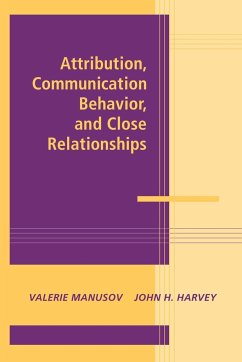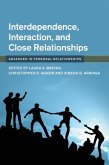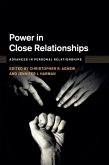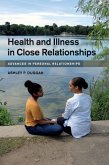Attribution, Communication Behavior, and Close Relationships
Herausgeber: Manusov, Valerie; Harvey, John H.
Attribution, Communication Behavior, and Close Relationships
Herausgeber: Manusov, Valerie; Harvey, John H.
- Broschiertes Buch
- Merkliste
- Auf die Merkliste
- Bewerten Bewerten
- Teilen
- Produkt teilen
- Produkterinnerung
- Produkterinnerung
Originally published in 2001, this volume brings together scholars from a variety of disciplines whose work focuses on the interplay of attribution processes and communication behavior in close relationships. The book shows ways in which diverse scholarly perspectives can blend to provide insight into areas of common interest.
Andere Kunden interessierten sich auch für
![Interdependence, Interaction, and Close Relationships Interdependence, Interaction, and Close Relationships]() Interdependence, Interaction, and Close Relationships40,99 €
Interdependence, Interaction, and Close Relationships40,99 €![Power in Close Relationships Power in Close Relationships]() Power in Close Relationships47,99 €
Power in Close Relationships47,99 €![Health and Illness in Close Relationships Health and Illness in Close Relationships]() Ashley P. Duggan (Massachusetts Boston College)Health and Illness in Close Relationships51,99 €
Ashley P. Duggan (Massachusetts Boston College)Health and Illness in Close Relationships51,99 €![The Sociocultural Context of Romantic Relationships The Sociocultural Context of Romantic Relationships]() The Sociocultural Context of Romantic Relationships131,99 €
The Sociocultural Context of Romantic Relationships131,99 €![Belief, Behavior, and Health Belief, Behavior, and Health]() Sandra D. LaneBelief, Behavior, and Health158,99 €
Sandra D. LaneBelief, Behavior, and Health158,99 €![On-Again, Off-Again Relationships On-Again, Off-Again Relationships]() Rene M. Dailey (Austin University of Texas)On-Again, Off-Again Relationships45,99 €
Rene M. Dailey (Austin University of Texas)On-Again, Off-Again Relationships45,99 €![Belief, Behavior, and Health Belief, Behavior, and Health]() Sandra D. LaneBelief, Behavior, and Health57,99 €
Sandra D. LaneBelief, Behavior, and Health57,99 €-
-
-
Originally published in 2001, this volume brings together scholars from a variety of disciplines whose work focuses on the interplay of attribution processes and communication behavior in close relationships. The book shows ways in which diverse scholarly perspectives can blend to provide insight into areas of common interest.
Hinweis: Dieser Artikel kann nur an eine deutsche Lieferadresse ausgeliefert werden.
Hinweis: Dieser Artikel kann nur an eine deutsche Lieferadresse ausgeliefert werden.
Produktdetails
- Produktdetails
- Advances in Personal Relationships
- Verlag: Cambridge University Press
- Seitenzahl: 406
- Erscheinungstermin: 7. Januar 2011
- Englisch
- Abmessung: 229mm x 152mm x 24mm
- Gewicht: 616g
- ISBN-13: 9780521177276
- ISBN-10: 0521177278
- Artikelnr.: 32302009
- Herstellerkennzeichnung
- Libri GmbH
- Europaallee 1
- 36244 Bad Hersfeld
- gpsr@libri.de
- Advances in Personal Relationships
- Verlag: Cambridge University Press
- Seitenzahl: 406
- Erscheinungstermin: 7. Januar 2011
- Englisch
- Abmessung: 229mm x 152mm x 24mm
- Gewicht: 616g
- ISBN-13: 9780521177276
- ISBN-10: 0521177278
- Artikelnr.: 32302009
- Herstellerkennzeichnung
- Libri GmbH
- Europaallee 1
- 36244 Bad Hersfeld
- gpsr@libri.de
List of contributors; Introduction Valerie Manusov; Part I. Attribution,
Affect, and Well-Being in Relationships: 1. Affective influences on
communication and attributions in relationships Joseph P. Forgas; 2.
Communication and attribution: an exploration of the effect of music and
mood on intimate couples' verbal and nonverbal conflict resolution
behaviors James M. Honeycutt and Michael E. Eidenmuller; 3. Making sense of
hurtful interactions in close relationships: when hurt feelings create
distance Anita L. Vangelisti; 4. The association between accounts of
relationship development events and relational and personal well-being
Jeanne Flora and Chris Segrin; Commentary: affect, attribution, and
communication: uniting interaction episodes and global relationship
judgments Denise Haunani Solomon; Part II. Attributions and Communication
in Dating and Marital Relationships: 5. Attributions, communication, and
the development of a marital identity Catherine A. Surra and Denise S.
Bartell; 6. Causal attributions of relationship quality Ellen Berscheid,
Jason Lopes, Hilary Ammazzalorso, and Nora Langenfeld; 7. The content of
attributions in couples' communication Valerie Manusov and Jody Koenig; 8.
Handling pressures for change in marriage: making attributions for
relational dialectics Patricia Noller, Judith A. Feeney and Anita
Blakely-Smith; 9. The role of marital behavior in the longitudinal
association between attribution and marital quality Matthew D. Johnson,
Benjamin R. Karney, Ronald Rogge, and Thomas N. Bradbury; 10. Stepping into
the stream of thought: cognition during marital conflict Alan Sillars,
Linda J. Roberts, Tim Dun, and Kenneth Leonard; Commentary: thanks for the
curry: advancing boldly into a new millennium of relationship attribution
research Frank D. Fincham; Part III. New Directions and Contexts for
Attributions and Communication: 11. Attributions and regulative
communications by parents participating in a community-based child
physical; abuse prevention program Steven R. Wilson and Ellen E. Whipple;
12. 'True lies': children's abuse history and power attributions as
influences on deception detection Daphne Blunt Bugental, William Shennum,
Mark Frank, and Paul Ekman; 13. HIV-infected persons' attributions for the
disclosure of the seropositive diagnosis to significant others Valerian J.
Dergla and Barbara A. Winstead; 14. Attributions about communications
styles and strategies: prediciting dating couples' safe-sex discussions and
relationship satisfaction Candida C. Peterson, Ashlea Troth, Cynthia
Gallois, and Judith Feeney; 15. Why do people have affairs? Recent research
and future directions about attributions for extramarital involvement David
Atkins, Sona Dimidjian, and Neil Jacobson; 16. Attribution in social and
parasocial relationships Rebecca B. Rubin and Alan M. Rubin; Commentary:
extending attribution theory: contributions and cautions Sandra Metts; Part
IV. A Discussion of Attribution Theory for Close Relationships: 17. The
status of attribution theory qua theory in personal relationships Brian H.
Spitzberg; 18. Are there superior options? Commentary on Spizberg's 'the
status of attribution theory qua theory in personal relationships' John H.
Harvey and Julia Ormazu; Index.
Affect, and Well-Being in Relationships: 1. Affective influences on
communication and attributions in relationships Joseph P. Forgas; 2.
Communication and attribution: an exploration of the effect of music and
mood on intimate couples' verbal and nonverbal conflict resolution
behaviors James M. Honeycutt and Michael E. Eidenmuller; 3. Making sense of
hurtful interactions in close relationships: when hurt feelings create
distance Anita L. Vangelisti; 4. The association between accounts of
relationship development events and relational and personal well-being
Jeanne Flora and Chris Segrin; Commentary: affect, attribution, and
communication: uniting interaction episodes and global relationship
judgments Denise Haunani Solomon; Part II. Attributions and Communication
in Dating and Marital Relationships: 5. Attributions, communication, and
the development of a marital identity Catherine A. Surra and Denise S.
Bartell; 6. Causal attributions of relationship quality Ellen Berscheid,
Jason Lopes, Hilary Ammazzalorso, and Nora Langenfeld; 7. The content of
attributions in couples' communication Valerie Manusov and Jody Koenig; 8.
Handling pressures for change in marriage: making attributions for
relational dialectics Patricia Noller, Judith A. Feeney and Anita
Blakely-Smith; 9. The role of marital behavior in the longitudinal
association between attribution and marital quality Matthew D. Johnson,
Benjamin R. Karney, Ronald Rogge, and Thomas N. Bradbury; 10. Stepping into
the stream of thought: cognition during marital conflict Alan Sillars,
Linda J. Roberts, Tim Dun, and Kenneth Leonard; Commentary: thanks for the
curry: advancing boldly into a new millennium of relationship attribution
research Frank D. Fincham; Part III. New Directions and Contexts for
Attributions and Communication: 11. Attributions and regulative
communications by parents participating in a community-based child
physical; abuse prevention program Steven R. Wilson and Ellen E. Whipple;
12. 'True lies': children's abuse history and power attributions as
influences on deception detection Daphne Blunt Bugental, William Shennum,
Mark Frank, and Paul Ekman; 13. HIV-infected persons' attributions for the
disclosure of the seropositive diagnosis to significant others Valerian J.
Dergla and Barbara A. Winstead; 14. Attributions about communications
styles and strategies: prediciting dating couples' safe-sex discussions and
relationship satisfaction Candida C. Peterson, Ashlea Troth, Cynthia
Gallois, and Judith Feeney; 15. Why do people have affairs? Recent research
and future directions about attributions for extramarital involvement David
Atkins, Sona Dimidjian, and Neil Jacobson; 16. Attribution in social and
parasocial relationships Rebecca B. Rubin and Alan M. Rubin; Commentary:
extending attribution theory: contributions and cautions Sandra Metts; Part
IV. A Discussion of Attribution Theory for Close Relationships: 17. The
status of attribution theory qua theory in personal relationships Brian H.
Spitzberg; 18. Are there superior options? Commentary on Spizberg's 'the
status of attribution theory qua theory in personal relationships' John H.
Harvey and Julia Ormazu; Index.
List of contributors; Introduction Valerie Manusov; Part I. Attribution,
Affect, and Well-Being in Relationships: 1. Affective influences on
communication and attributions in relationships Joseph P. Forgas; 2.
Communication and attribution: an exploration of the effect of music and
mood on intimate couples' verbal and nonverbal conflict resolution
behaviors James M. Honeycutt and Michael E. Eidenmuller; 3. Making sense of
hurtful interactions in close relationships: when hurt feelings create
distance Anita L. Vangelisti; 4. The association between accounts of
relationship development events and relational and personal well-being
Jeanne Flora and Chris Segrin; Commentary: affect, attribution, and
communication: uniting interaction episodes and global relationship
judgments Denise Haunani Solomon; Part II. Attributions and Communication
in Dating and Marital Relationships: 5. Attributions, communication, and
the development of a marital identity Catherine A. Surra and Denise S.
Bartell; 6. Causal attributions of relationship quality Ellen Berscheid,
Jason Lopes, Hilary Ammazzalorso, and Nora Langenfeld; 7. The content of
attributions in couples' communication Valerie Manusov and Jody Koenig; 8.
Handling pressures for change in marriage: making attributions for
relational dialectics Patricia Noller, Judith A. Feeney and Anita
Blakely-Smith; 9. The role of marital behavior in the longitudinal
association between attribution and marital quality Matthew D. Johnson,
Benjamin R. Karney, Ronald Rogge, and Thomas N. Bradbury; 10. Stepping into
the stream of thought: cognition during marital conflict Alan Sillars,
Linda J. Roberts, Tim Dun, and Kenneth Leonard; Commentary: thanks for the
curry: advancing boldly into a new millennium of relationship attribution
research Frank D. Fincham; Part III. New Directions and Contexts for
Attributions and Communication: 11. Attributions and regulative
communications by parents participating in a community-based child
physical; abuse prevention program Steven R. Wilson and Ellen E. Whipple;
12. 'True lies': children's abuse history and power attributions as
influences on deception detection Daphne Blunt Bugental, William Shennum,
Mark Frank, and Paul Ekman; 13. HIV-infected persons' attributions for the
disclosure of the seropositive diagnosis to significant others Valerian J.
Dergla and Barbara A. Winstead; 14. Attributions about communications
styles and strategies: prediciting dating couples' safe-sex discussions and
relationship satisfaction Candida C. Peterson, Ashlea Troth, Cynthia
Gallois, and Judith Feeney; 15. Why do people have affairs? Recent research
and future directions about attributions for extramarital involvement David
Atkins, Sona Dimidjian, and Neil Jacobson; 16. Attribution in social and
parasocial relationships Rebecca B. Rubin and Alan M. Rubin; Commentary:
extending attribution theory: contributions and cautions Sandra Metts; Part
IV. A Discussion of Attribution Theory for Close Relationships: 17. The
status of attribution theory qua theory in personal relationships Brian H.
Spitzberg; 18. Are there superior options? Commentary on Spizberg's 'the
status of attribution theory qua theory in personal relationships' John H.
Harvey and Julia Ormazu; Index.
Affect, and Well-Being in Relationships: 1. Affective influences on
communication and attributions in relationships Joseph P. Forgas; 2.
Communication and attribution: an exploration of the effect of music and
mood on intimate couples' verbal and nonverbal conflict resolution
behaviors James M. Honeycutt and Michael E. Eidenmuller; 3. Making sense of
hurtful interactions in close relationships: when hurt feelings create
distance Anita L. Vangelisti; 4. The association between accounts of
relationship development events and relational and personal well-being
Jeanne Flora and Chris Segrin; Commentary: affect, attribution, and
communication: uniting interaction episodes and global relationship
judgments Denise Haunani Solomon; Part II. Attributions and Communication
in Dating and Marital Relationships: 5. Attributions, communication, and
the development of a marital identity Catherine A. Surra and Denise S.
Bartell; 6. Causal attributions of relationship quality Ellen Berscheid,
Jason Lopes, Hilary Ammazzalorso, and Nora Langenfeld; 7. The content of
attributions in couples' communication Valerie Manusov and Jody Koenig; 8.
Handling pressures for change in marriage: making attributions for
relational dialectics Patricia Noller, Judith A. Feeney and Anita
Blakely-Smith; 9. The role of marital behavior in the longitudinal
association between attribution and marital quality Matthew D. Johnson,
Benjamin R. Karney, Ronald Rogge, and Thomas N. Bradbury; 10. Stepping into
the stream of thought: cognition during marital conflict Alan Sillars,
Linda J. Roberts, Tim Dun, and Kenneth Leonard; Commentary: thanks for the
curry: advancing boldly into a new millennium of relationship attribution
research Frank D. Fincham; Part III. New Directions and Contexts for
Attributions and Communication: 11. Attributions and regulative
communications by parents participating in a community-based child
physical; abuse prevention program Steven R. Wilson and Ellen E. Whipple;
12. 'True lies': children's abuse history and power attributions as
influences on deception detection Daphne Blunt Bugental, William Shennum,
Mark Frank, and Paul Ekman; 13. HIV-infected persons' attributions for the
disclosure of the seropositive diagnosis to significant others Valerian J.
Dergla and Barbara A. Winstead; 14. Attributions about communications
styles and strategies: prediciting dating couples' safe-sex discussions and
relationship satisfaction Candida C. Peterson, Ashlea Troth, Cynthia
Gallois, and Judith Feeney; 15. Why do people have affairs? Recent research
and future directions about attributions for extramarital involvement David
Atkins, Sona Dimidjian, and Neil Jacobson; 16. Attribution in social and
parasocial relationships Rebecca B. Rubin and Alan M. Rubin; Commentary:
extending attribution theory: contributions and cautions Sandra Metts; Part
IV. A Discussion of Attribution Theory for Close Relationships: 17. The
status of attribution theory qua theory in personal relationships Brian H.
Spitzberg; 18. Are there superior options? Commentary on Spizberg's 'the
status of attribution theory qua theory in personal relationships' John H.
Harvey and Julia Ormazu; Index.








